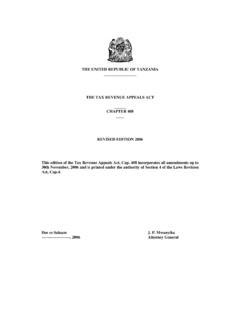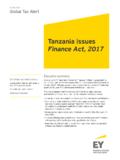Transcription of IN THE HIGH COURT OF TANZANIA AT DODOMA ... - SAFLII
1 IN THE HIGH COURT OF TANZANIA . AT DODOMA . micellaneous civil APPLICATION NO. 66 OF 2003. (ORIGINAL civil CASF NO. 43 OF 1999 OF THE. DISTRICT COURT OF OODOMA AT DODOMA ). 1. HEMED HUSSEIN. 2. MAKOLOKOlO Bil ALl 3. MOSI IBIGA. 4. MWINYI MPAGAMA. 5. STAMBI MUHULOTO. 6. SAlOl SIMBA. RULI~ G/ORDER. What the learned advocate Mr. Nyangarika, tells me and what I read on record are two different things. Mr. Nyangarika tells me that he is making an application for leave to appeal to this COURT out of time, against the decision of the District COURT of Kongwa, made on He tells me that he was late in appealing to this COURT . After realizing that he was late in appealing to this coun, he made an application for leave to appeal out of time, an application which was, according to him, sumrrlarily rejected. He says the Judge dismissed it suo motu. After seeing that the judge had dismissed it summarily, he put up another application for review.
2 This, again, was dismissed. That is what he tells me. Now, my reading of the entire record reveals this: Nyembela Gandawega filed a case in the District COURT of DODOMA , in civil Case No. 43/1999 against six persons, claiming for general damages arising out of injuries he sustained after the defendants had beaten him up. He said, as a result of the beating, he became incapacitated and caused other people to steal from him cash money and a wrist watch, quite easily. He won the case. That was on Three months" later~ he obtained a decree and went on to execute the decree. Total sum had risen ":0. , I! On , some six months later, the plaintiff filed a case in the High COURT . He filed a cas~. for revision in Miscellaneous civil Revision no. 6 of 2001. He did not file an appeal. "". That Miscellaneous civil Revision No. 6/2001 was struck out as being time barred. In fact, both the application for a revision or an appeal, were both time barred.
3 The plaintiff did not want to give up. He filed what , he called a review. His application for review was als9. ! thrown overboard by Kaijage J, on Now,, the plaintiff has sought, once again, to appeal for leave to appeal to this High COURT , out of time, against the judgment of the District COURT , given on This application for extension of time, within which to appeal to this COURT , is ill conceived. Th ~re has been, on record, no reasonable cause for the delay. At best, I see the delay to be caused by lack of knowledge on part of advocates on appeal matters. The advocate, or, the plaintiff, after the judgment of the District COURT of Oodoma was read on should have appealed to the High COURT against that decision. And, even when he was late, he ougbt to haVE. applied to appeal out of time, and not ask for revision, When he was ruled out, he came back and filed ar application to review the dismissal order. In othe words this is a common confusion on the legal term~.
4 Review and revision. Once again, let me explain, a review and a revisiotl are two different matters. A revision, under the civil Procedure Code, envisages a correction of error~. apparent on the face of the record. But, the correctioll is done by a higher COURT , not the same COURT . A review, on the other hand, is also 'a correction c r'. errors apparent on the face of the record. But, this i ~. done by the same COURT that gave the earlier judgment. This is what the author Agarwala says, in The civil Procedure Code - 3rd edition, on reviews: "It is well settled that the power of review is not an inherent power of a judicial officer, but such a right can only be conferred by statute". '}\ review is practically the hearing of an appeal by the same officer who decided l the case". "a right to review is not an inherent power.". "One judge cannot set aside an order made by,'.. I. another judge of the same COURT , although it '.
5 ;, may be wrong.". '}\ COURT is not entitled to review its order without notice to the other side". "Discovery of fresh evidence is not ground fot . review on second appeal.". ''An error of law is not sufficient reason for granting review.". ''Any other sufficient reason must be taken rejusdem generis with the clauses preceding .., . "The person who wants review should at leas". prove strictly the diligence he claims, to have exercised and also that the matter or evidence which he wishes to have access to is, if not absolutely conclusive, nearly conclusive of the matter. The application for review cannot succeed on the ground of discovery of new and important matter or evidence which after exercise of due diligence, could not be produced at the time of passing the decree.". "The ground for review must be something which existed on the date of the decision of decree: and not subsequent to the date of the decree.". '~ COURT has jurisdiction to decide wrongly.
6 ". "In correct interpretation of the law is not an apparent mistake on the face of the record. '{~l~'. II. '~n error of law is not sufficient reason for granting review.". '~ party ought not to be allowed in review to raise a case which was never raised at the trial and on which no evidence was adduced. ". "Grounds for review must be in existence on the date of the decree.". "When appeal is preferred, review is out of question and the party's procedure is to apply to the appellate COURT to admit additional evidence.". "When an application for review is ordered, the judgment sought to be reviewed is not set aside, but only held in suspense until the case has been re-heard.". t~ ground of review must be something which existed at the time of the decree. The rule does not authorize the review of ajudgment which was right when made, but is shown t(. be erroneous by the happening of a subsequent event. So, when a judgment is based on a decision of COURT , but subsequently it is set aside by a Superior COURT , that fact is not a good ground for the granting of review".)}
7 T~ review may be granted, even on a ground not argued at the original hearing of the suit, in order to rectify some mistake or error apparent on the face of the record. Where the mistake is apparent on the face (f the record, then, irrespective of whether the I. forward appeared to be outside the ambit of . the Incidentally, the words "any other sufficient reason" got defined in the Indian case of Chhaiju Ram . v. Neki and Others 1922 3 Lah 127 to mean: "a reason sufficient on grounds at least analogous to those specified immec{iately previously. 11. In Attilio v Mbowe [1970] 3, Georges said: "Review involves correction of an error which was either apparent on the face of the record or had been clear because of subsequently discovered circumstances. 11. And Mnzavas J. noting in Mbolye Mhurula v Sanya Mbolye (1974) N. 48 that: "the Principle underlying a review is that the COURT would not have acted as it had if all the circumstances had been known.)}
8 1J. And Mnzavas in fact remarked, in Mbolye's case, that the application for a review before him was "an appeal in disguise.". Revisions, as I said earlier, are different matters. They are, as I said, instigated by higher courts, in most cases. A better illustration would be, in the words of our brothers Mrosso J. (as he then was) in Awaki Shauri v Christopher Gwandu & Another civil Revision of 98 Arusha High COURT Registry, where he said: "It is true that the High COURT can decide to revise lower COURT proceedings, decree or order after reading periodic civil returns or upon receiving an informal complaint either by word of mouth, by a letter or even as a result of radio or newspaper information. It is then that the COURT , of its own motion, .orders revision proceedings to be opened.". And, indeed , as pointed out by Mchome J. in Israel Mwakalabeya v. Ibrahim Mwaijamba Miscellaneous civil Application No. 21/91 Mbeya HC: "the right to invoke the Courts powers of revision is not an alternative to appealing.
9 Where the order complained against is appel/able, the COURT wil/ not use its revisional powers, for the right to appeal is a remedy open to the aggrieved party. Even where the time for appealing has expired, a party has the remedy of applying to appeal out of time. ". Now, to come back to the instant application, thE. record amply reveals that there were a lot of inadvertences in the case. Both the applicants and their advocate just did not know what they were doing hence the application for revision, then review, a















![CONSTITUTIONAL COURT OF SOUTH AFRICA [2011] ZACC 26 ...](/cache/preview/7/3/4/c/f/2/1/e/thumb-734cf21e72e13f5037e72f2a2eaf9f71.jpg)


